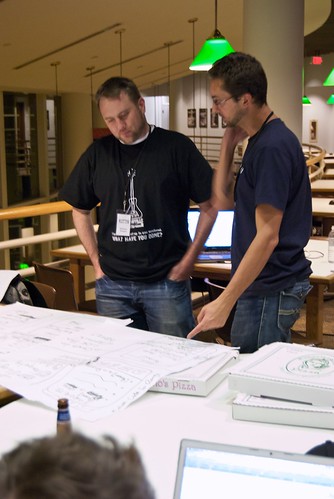
Nicholas Holland and Jackson Miller, pictured here, launched gpsAssassin, a location-based multi-player iPhone game, after developing the company and product at last year's Nashville Startup Weekend
 photo credit: tmgstudio
photo credit: tmgstudio
This weekend I participated in Nashville Startup Weekend. That’s right: the idea behind this event is to start up a business in a single weekend.
My team (which ranged over the course of the weekend from as many as 8 people at the beginning to as few as 3 people still going at 5:00 AM after Saturday’s work session, and back up to 6 when we presented our new company on Sunday evening) successfully scoped, designed, and built a prototype of a web-based application dealing with group food ordering. We also developed the business plan, marketing plan, and financials for both a bootstrapped and an invested approach all between Friday evening and Sunday afternoon.
This is not merely an exercise; this is a viable business that we will be launching in the coming weeks. Our presentation even garnered investor interest.
In short, over the course of a weekend, with the help of pizza, beer, coffee, and Red Bull, a new company was developed with a marketable product and a business model that is cash flow positive in month 1, profitable in month 3, and can either produce dividends for its creators or become an attractive acquisition target in the months and years to come. And that was only one team: several other companies formed this weekend, too.
The big takeaway from the weekend is this: it doesn’t necessarily take a lot of time or money to do something awesome. What it takes is focus and determination to get it done.
The next time you question whether something can be done, or whether you have the time or resources to do it, maybe try figuring out what you can do. And then do it. And then figure out a way to make the next step happen. And then do it.
It sounds simple enough, but inertia can be hard to overcome. Making that first step is challenging, but incredibly rewarding when it leads to a finished product.
Happy Monday! Here’s hoping your week is full of focus and determination.






